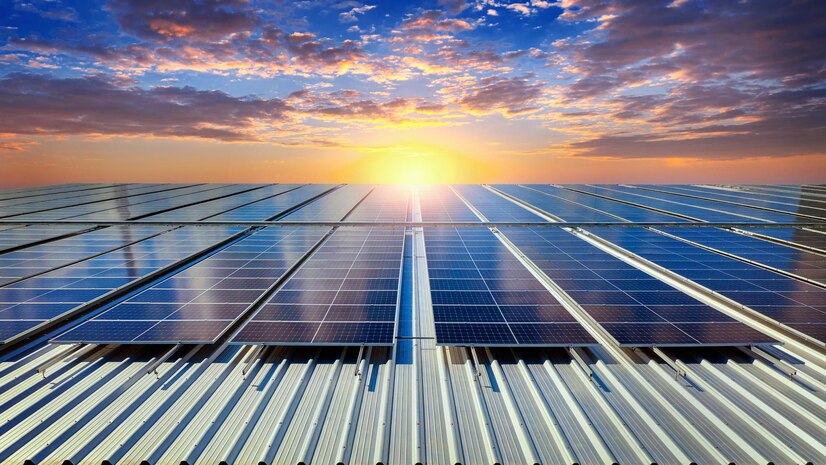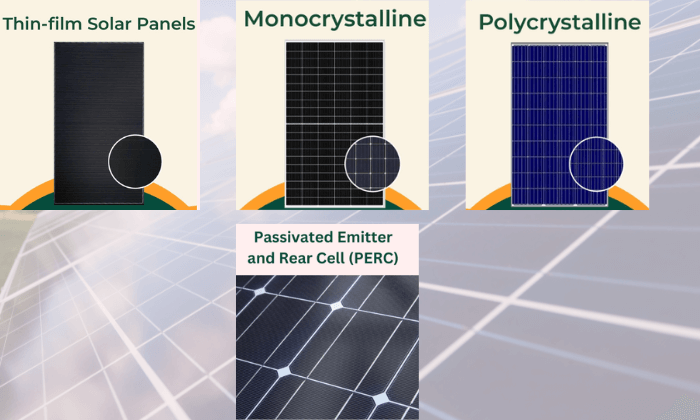What are Commercial Solar PV Systems?
Businesses seeking clean, renewable energy solutions can tailor commercial solar PV systems to their needs. Many businesses, schools, and governments use this new technology for their operations.
Photovoltaic (P.V.) panels play a crucial role in commercial solar energy by converting sunlight into electricity. Solar panels made of silicon cells create electricity through a process called photovoltaic transformation. They have positive and negative layers that produce an electric field. These panels are interconnected to form a solar photovoltaic array on large grounds or building rooftops.
Rooftop solar panels are a newer and more efficient option for commercial solar systems compared to ground-mounted ones. They use sunlight from building rooftops effectively. Let’s delve into the specifics of these innovative systems.
Installation of solar panels on commercial buildings to harness solar energy and produce power. The power produced can significantly offset a substantial portion of the company’s energy needs, saving considerable energy costs. This green solution helps businesses and public buildings reduce carbon emissions. It creates a more eco-friendly environment in places like schools and hospitals.
Integrating solar panels into the commercial electricity network involves strategic placement on nearby lands, office buildings, and rooftops. The photovoltaic system, commonly known as a solar P.V. system, efficiently converts solar energy into electricity, fulfilling the energy requirements of the building.
This sustainable energy source remains accessible year-round, with peak efficiency, especially during summer. You can install storage systems to maximize utilization, allowing you to use the stored energy even after sunset. Using solar power helps reduce reliance on traditional energy sources and strengthens the power grid’s resilience.
Why Should You Use Commercial Solar PV Systems?

Commercial solar power systems provide clean, renewable energy without emitting carbon dioxide and needing little maintenance.
Businesses can substantially reduce their electricity bills and carbon footprint by incorporating commercial and industrial solar systems. Putting solar panels on roofs or buildings can create enough solar power to meet all the energy needs of the building.
The electricity harnessed from solar arrays is versatile, powering interior and exterior areas at a cost-effective rate. Many people save more than 25% on their energy bills by switching to commercial solar systems.
This shows the economic benefits of choosing this eco-friendly option. Businesses that install commercial solar systems help fight climate change and protect the planet for future generations. Embrace the power of commercial solar panels to impact your bottom line and the environment positively.
Solar Power Feasibility For Your Business or Public Agency Building
Installing solar panels can reduce electricity costs for businesses that operate during the day. This can result in significant savings for companies that have high electricity usage.
The return on investment for commercial solar installations typically materializes within four years. Investing in solar renewable energy translates to cost savings through reduced energy consumption, contributing to financial and environmental sustainability.
Financial gains are pivotal in adopting solar technology, and the advantages are noteworthy. A commercial solar PV system, including operations and maintenance costs, delivers electricity at approximately 9 cents per kWh. In comparison, the current grid supply pricing is 13 cents per unit. This cost disparity underscores the financial benefits of transitioning to solar.
Funding a commercial solar system can lead to profit in 5 years, making it a good financial choice. Solar panels are low maintenance because they don’t have moving parts. This makes them a convenient and affordable energy option for businesses. Embrace commercial solar installations’ financial advantages and sustainability benefits for a brighter and more efficient future.
Types of Solar Panel Systems

Choosing the right solar panels can feel overwhelming. There are many options available for both commercial and residential use. This can make the decision-making process difficult.
Important to carefully consider your needs before switching to solar power. Let’s explore some types to help you navigate this decision:
Manufacturers craft solar panels from various materials, and currently, they widely use crystalline silicon. Within this category, we have monocrystalline, polycrystalline, and thin-film panels.
Monocrystalline panels, known for their efficiency, are a popular choice for new solar installations despite being more expensive. They set the standard for effectiveness in the industry.
Polycrystalline silicon panels, made from multiple silicon crystals, offer a cost-effective alternative, especially in grid-tied solar setups. While less efficient than monocrystalline panels, they are practical for specific applications.
Thin-film solar cells, composed of amorphous silicon, provide flexibility and are great for curved surfaces. Though less common, they are an excellent option when flexibility is a priority.
Solar panels typically last for several decades, requiring minimal maintenance. Knowing that even though it costs a lot at first, investing in your solar system is crucial is important. Knowing the variations in panel types helps you choose the best one for your needs and preferences.
Business Benefits of Going Solar
Residential and commercial businesses embracing solar energy gain numerous advantages, fostering sustainability across various aspects. Below, we’ll delve into the benefits of incorporating a commercial solar PV system:
Lowered Operating Costs
Investing in a commercial solar PV system enables businesses to reduce long-term operational costs. Though an initial consideration, solar system cost becomes a prudent investment over time.
Solar energy is cheap and easy to use. Companies can have their own clean energy source, making them independent in generating electricity. This move stabilizes electricity costs, offering a more predictable revenue flow than relying on external energy suppliers. Commercial solar installations are a multi-decade investment despite the upfront cost, considering their low maintenance expenses.
Businesses can figure out the cost of each unit of solar energy to understand the financial benefits. Monitoring and optimizing the system’s performance can further enhance energy production efficiency, maximizing the return on investment. Using incentives such as the solar investment tax credit can lower the initial costs. This makes the transition to solar power more attractive financially.
Enhanced Energy Control and Resilience with Commercial Solar
Companies with P.V. solar systems enjoy greater energy independence by producing sustainable electricity on-site. Solar installations contribute to energy resilience, especially by incorporating storage systems that operate as microgrids. This independence shields businesses from disruptions caused by external power failures, ensuring continuous operations during grid outages.
Solar Energy Accomplishes E.S.G. Goals
Solar energy aligns with organizations’ Environmental, Social, and Governance (E.S.G.) objectives. Beyond cost savings, adopting solar power contributes to sustainability goals and provides power and measurable and quantifiable green energy assets. Commercial solar systems immediately reduce a building’s carbon footprint, supporting immediate decarbonization. Solar power systems are easy to use in businesses, helping them keep running smoothly and increase their energy.
Federal Investment Tax Credit
The Federal Investment Tax Credit (I.T.C.) has played a pivotal role in reducing the cost of solar installations. Qualified enterprises can leverage this incentive to offset system expenses from their federal income taxes significantly.
Some organizations have restrictions. However, businesses can still take advantage of the I.T.C. by using options like Tax Equity Financing or third-party ownership. These options require less money upfront.
Amount of Land Required for Commercial Solar Projects
The land requirement for commercial projects, including the largest commercial solar systems, depends on sunlight availability, storage capacity, and the building’s electricity needs. When considering solar farm construction, it’s essential to note that 100 square feet typically accommodate 1 kW of solar panels, while a utility-scale solar project may require 200 square feet. Many solar providers primarily work with businesses with available rooftop space for solar installations, offering project size and scope flexibility.
Embracing a commercial solar PV system addresses financial considerations and positions businesses as environmentally responsible entities, contributing to a sustainable and resilient future. Moreover, it’s worth noting that solar systems are larger when deployed in ground-mounted configurations, allowing for increased energy production and efficiency in specific scenarios.
Commercial Solar Installers
Choosing to install solar system is a significant decision that warrants careful consideration and thorough research. Various factors can influence the timeline for completing the project. Suppose you’re interested in going solar and need additional information before you want to switch to solar energy or are ready to initiate your next solar system project. In that case, we encourage you to contact Solar Earth Inc.
We design & supply solar systems for commercial P.V. applications at low wholesale prices.
Solar Earth Inc. is well-equipped and provides solar design that suits and offers S.M.A. the best commercial solar panel systems instead of Canadian solar systems. Feel free to contact us to discuss your specific requirements and gather insights that will contribute to your solar project’s smooth and efficient completion. We’re here to assist you every step of the way, ensuring you make informed decisions aligned with your goals.
Contact Our Friendly, Knowledgeable Staff
Solar Earth Inc., with expertise and certifications, empowers your home for enhanced energy generation. Contact us today to transform your home into a sustainable, long-term renewable energy source.
Get a free quote or Call at (805) 691-8000
F.A.Q.s
A: The best solar system for commercial use depends on factors like energy needs, available space, and budget. Generally, high-efficiency panels with durability and warranty support are preferred for commercial installations.
A: The cost of a 100kW solar system varies, but it can range from $75,000 to $150,000, depending on location, system components, and installation factors.
A: Commercial solar panels are designed for larger-scale energy production, often with higher efficiency and durability than residential panels.
A: Commercial solar panels are typically more efficient, designed to handle higher energy demands and produce greater output per square foot than residential panels.
A: The number of solar panels needed for a 100kW system depends on the panel's wattage, but roughly 300 to 400 panels may be required.
A: A 100 kW solar system can produce approximately 140,000 to 160,000 kWh annually, depending on location and sunlight availability.
A: The cost of a 120 kW solar system varies, but it can range from $90,000 to $180,000, depending on various factors.
A: A commercial solar system converts sunlight into electricity using photovoltaic panels, which generate direct current (D.C.) electricity. Inverter systems convert D.C. to usable alternating current (A.C.) for the building's power needs.
A: Commercial photovoltaic systems include rooftop solar installations, ground-mounted solar farms, solar carports, and building-integrated photovoltaics (BIPV).
A: No, large commercial solar systems differ from residential systems in scale, design, and efficiency. Commercial systems are tailored for higher energy demands and often use more advanced technology.
A: Yes, solar panels are worth it for many homeowners and businesses, providing long-term energy savings, environmental benefits, and potential incentives or tax credits.
A: The cost-effectiveness of a commercial P.V. system depends on factors like energy consumption, local incentives, and the system's efficiency. Generally, businesses can expect significant long-term savings on electricity costs.
A: Solar panels are less efficient in shaded areas, as they rely on direct sunlight for optimal performance. However, some advanced technologies and system designs mitigate the impact of shading.
A: The cost of commercial solar panels varies based on factors such as system size, location, and specific requirements. On average, costs range from $1.50 to $2.50 per watt.
A: Commercial solar panels are installed by professionals who assess the site, design the system, secure necessary permits, and install, ensuring optimal performance and adherence to regulations.
A: Rooftop solar panels capture sunlight with photovoltaic cells, generating direct current (D.C.) electricity. Inverter systems convert D.C. to usable alternating current (A.C.) for the building's electrical needs.
A: Sizing a commercial solar system involves assessing the energy needs of the business, available rooftop or ground space, and local sunlight conditions. Professional solar installers use this information to determine the appropriate system size.
A: The number of solar panels needed for commercial use depends on energy consumption, panel efficiency, and available space. Professional solar installers perform a detailed analysis to determine the optimal number of panels.
A:
Installing a solar power system in your business offers cost savings, environmental responsibility, and energy independence. It reduces operational expenses, demonstrates a commitment to sustainability, and ensures continued electricity generation during outages.
